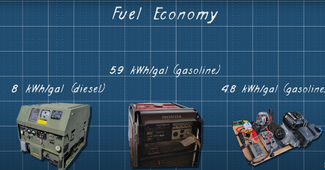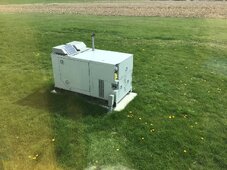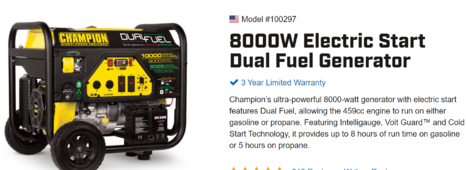I've gradually come to learn that fossil fuel generator power is not 'the best'. The mechanical/physical *effort/horsepower* required to generate electricity by engine or water or wind is huge. PV is just sooo much smoother, quieter, no mechanical maintenance etc etc. The horsepower/noise/fuel for 6000w of charging power just seem like a loosing effort compared to panels.
My biggest disappointment is heating the house. I've tracked my whole house, highly efficient, 4-ton heat-pump over a few years now with some years being 100% electric and some being natural gas assist. I live in a mild Zone 4 climate and thought, 100% electric + PV + generator (in winter) = no problem.
But I've come to see generators as not practical or best use of fuel for heat - even with a heat pump + mild climate (avg 35F low).
For example, to do 100% electric heat for the 4 months of winter in a 2600sq ft house I need ~5600kwh of power. My 14.5kw PV (51 panels) get's me ~2400kwh of that leaving a 3200kwh for the gap. Using natural 200 Therms of natural gas (~200gal of propane) the heat-pump 4 month power use drops to ~2400kwh.
3200kwh / 200gal means I'd need to generate 16kwh / gal of propane to go 100% electric route. Turning it around, I'd need 533gal of propane instead of 200gal for the same heat + maint to mechanically generate 3200kwh It's just more efficient to use fuel for heat than to generate electricity for heat.
Deeply disappointing compared to my original rose colored glasses.
However, if I could just build a container with 40 or 60 or 80 used EV batteries and store 4000kwh of power during summer to be used during winter - it would only be 1 cycle per year so used EV batteries should work great!







